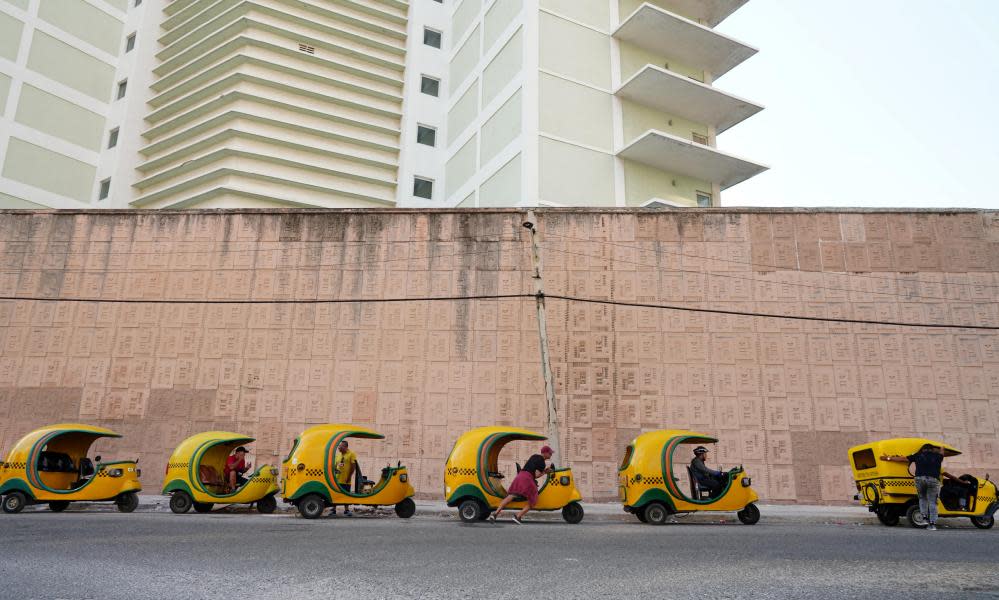Cuba cancels workers’ day parade as severe oil shortages bite

There was a time when International Workers’ Day was marked in Cuba by parades involving more than a million people marching through Havana’s Revolution Square. Many came out of conviction, some because they were pressured, others to enjoy the party.
This Monday, however, the square will be empty, after the Cuban Communist party cancelled this year’s celebrations due to gasoline shortages that are crippling the island’s economy.
For weeks, motorists have been sleeping in their cars outside petrol stations in queues that stretch for miles and last for days.
President Miguel Díaz-Canel has said the island is only receiving two-thirds of the petrol it needs, and that the shortfall is due to supplier nations failing to fulfil their contractual agreements.
Jorge Piñon, director of the University of Texas at Austin’s Latin America and Caribbean energy and environment program, said this was an allusion to Venezuela. The two socialist nations have had a barter agreement since 2000: Cuba sends Venezuela doctors, teachers and – allegedly – counterintelligence agents in exchange for shipments of crude. That deal is now being strained.
Related: US officials fly to Venezuela for talks in apparent bid to further isolate Russia
“For the last two decades Venezuela has been losing that revenue by not selling that oil on the international market,” Piñon said. “I think they’ve just come to a point where they can no longer continue to provide cash-free oil to the Cubans.”
Venezuela’s exports to Cuba have dropped by about 50% over the past decade as overall oil production has decreased due to corruption, mismanagement and sanctions. But the war in Ukraine has brought a new dynamic into play.
Hungry for crude after sanctioning Russian oil and gas, Washington last November issued Chevron a license to export Venezuelan petroleum to the US for the first time in years.
This has put Cuba in a quandary: the island has plenty of crude, but it is of low quality and the island’s refineries are unable to process it. Venezuela’s higher-quality crude, it seems, is now going to the US.
Cash-crunched Cuba struggles to buy fuel, or even diluents which could be used to refine high-sulphur crude into gasoline, on the international market.
“Maximum pressure” sanctions, imposed by the Trump administration and mostly left in place by President Biden, play into this, knocking billions of dollars a year off state foreign currency earnings, penalising oil tankers that dock at the island and cutting credit lines.
Economists warn that if the situation persists, food prices will rise and productivity will fall even lower. This year’s sugar harvest is set to be the worst in over a century after diesel shortages have prevented cane getting to refineries.
Despite the malaise, Ulises Guilarte de Nacimiento, the head of the Workers’ Central Union of Cuba, said on Tuesday that workers’ day won’t be completely cancelled. Celebrations in local communities, schools and workplaces will go ahead, under conditions of “maximum austerity”, he said.
William LeoGrande, professor of government at American University in Washington DC, who has written extensively about Cuban politics, said that turnout for the May Day parade has gradually diminished over the years as the huge excitement and hope about the social changes the revolution brought about in the 1960s and 1970s has been largely replaced by disappointment about the hardship since the 1990s.
“Revolutionary spirit has dissipated,” he said. “And honestly life is so difficult in Cuba right now there’s not much to celebrate.”
Rogelio Sanchez, 41, from a small town west of Havana, is more likely to spend the day waiting in line for fuel.
“We’ve spent four days looking for fuel,” he said. “I can’t bear this anymore.”

